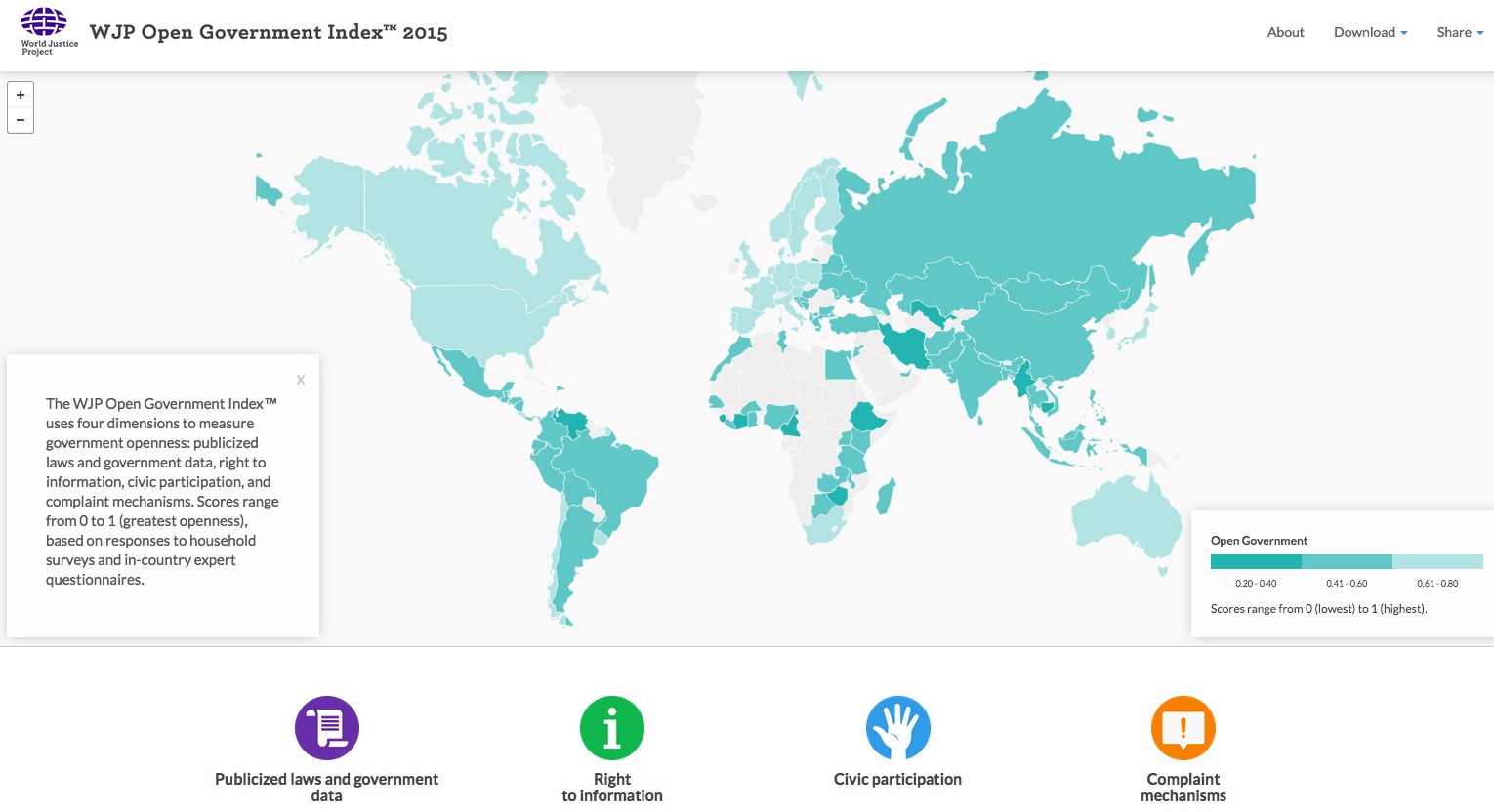Is this really a true picture of Open Government Worldwide?
With evaluations such as “incredible”, “rather amazing figure”, and “missed opportunity”, Dr Ben Worthy of LSE and Helen Darbishire of Access Info analyse the World Justice Project’s Index 2015 and raise a series of important questions, including how accurate is the finding that 63 million people around the world asked for government information last year? Do 88% of Belarusians really get full responses to requests from government? Are 85% of Austrians aware of their (almost non-existent) FOIA law? Do 7% of Finns really pay bribes to get official information, the same level as Russia at 8%? Why is the request response rate in France, Italy and Spain so much higher here than that found in other monitoring surveys?
Worthy sympathises with the difficulties of measuring openness, while Darbishire is concerned that it “doesn’t contribute in any credible or meaningful way to the current understanding of the right of access to information and levels of transparency globally.”
The following article was originally published in FreedomInfo.org.
The author is the Director of Access Info Europe.
From a right of access to information perspective, a significant structural flaw in the World Justice Project Open Government Index is to have conflated this right with access to personal data, and other types of “information requests” such as obtaining information for local business purposes, information seeking by lobbyists and questions from journalists. (See FreedomInfo.org article.)
Hence while the report asserts that it has asked people about whether they are familiar with freedom of information laws, it is clear that those who designed the subsequent questions were not sufficiently aware of these laws to distinguish in the research between people making information requests using them and a variety of other interactions with public bodies of the type that occur on a day-to-day basis.
The imprecision of the survey inevitably massively skews the results on whether or not people get responses and information. We know from monitoring in many countries that it’s often easier to get a response from a public authority to a data subject access request (ie: about oneself) than to get a reply to a request for other types of information.
This is a regrettable missed opportunity given the paucity of data globally on how the right of access to information is working in practice and whether it is delivering information to those who ask for it.
The formulation of most of the survey questions contain the same structural flaws and hence lead to highly dubious results. To take a few examples, comparing the survey findings with other available data-sets on the right of access to information:
- Incredible public knowledge of access to information laws: According to the survey 85% of Austrians are aware of an access to information law, even though that law barely exists, compared with 63% of Swedes, which has a well-established law; the Swedish number is credible, the Austrian data is simply now. Similarly, that 44% of Italians or 30% of the French are “aware” of their access to information laws seems improbable, given the chronic underuse of the law in those countries. Even if we were talking about data protection laws I don’t think the numbers work.
- The strange data on request volumes: According to these findings, only 9% of Swedes requested info, whereas 23% of Austrians and 22% of Italians used their barely existent laws, and 15% of people in Spain seem to have filed requests already (in spite of the difficulties in doing so – needing an electronic ID which 15% of people don’t even have!!). Clearly this is caused by confusion with personal data protection requests but still not credible. It may be that in some more developed transparency regimes much information is already available but the trends across countries don’t make sense.
- Remarkable data for receiving info: Rather amazingly the survey tells us that 65% of information requests in Spain are answered and 52% in Italy. More structured monitoring by Access Info Europe and our partners Civio and Diritto di Sapere has found that in Spain we have a consistent level of above 50% administrative silence in Spain over the past few years and 65% in Italy (see Freedom Info report here: http://www.freedominfo.org/2013/04/monitoring-study-finds-poor-response-rates-in-italy/). France at 80% is laughable for access to information according to our research, although might be a reasonable rate for personal data requests. As to Belarus, where there is no law, the idea that 88% of requests are answered compared with 72% in Finland and 71% in Sweden, is simply kooky.
- Bribes for obtaining information in Scandinavia: According to the WPJ as many as 7% of Finns and 3% of Swedes paid bribes to get the info they requested, the same level as reported for Spain. Contrasted with this, 0% of Norwegians have paid bribes for info and, interestingly, the rate of bribery is also 0% in Belarus. From Access Info Europe’s perspective, we don’t have one documented case from Western Europe of anyone being asked for or paying a bribe to get information, which is not to say that it doesn’t or could not happen on rare occasions, although a rate of 7% in Finland is striking to say the least. We have heard of such cases in Russia and elsewhere in the world – interestingly this survey puts Russia at an 8% bribery rate, similar to Finland and better than Italy’s full 13%.
Overall, with such questionable data, I fear that this survey doesn’t contribute in any credible or meaningful way to the current understanding of the right of access to information and levels of transparency globally. Worse, it risks undermining right to information campaigns in a number of countries where civil society is seeking reform of the legal framework and improvements in practice.

